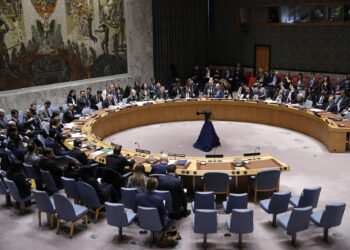Julian Sayarer is an award-winning author and journalist. He is the author of Türkiye: Cycling Through a Country's First Century and Fifty Miles Wide: Cycling Through Israel and Palestine, among other books. His writing has appeared in the London Review of Books, The Guardian, the Financial Times and other publications.
At a hip-hop event in Ramallah some years ago, hearing that I had arrived from Istanbul, the bouncer I was talking to exclaimed happily: "Your man Erdoğan—he is the only one who stands up for us." Days later, cycling through Al-Khalil, or Hebron, I saw ads posted for Turkish language classes. The father of a Palestinian-American friend will hear no bad word against Turkey's president. To him, Recep Tayyip Erdoğan represents a refusal to be talked down to, or have policy dictated to, unlike so many Arab leaders. Among Palestinians, he hardly seems alone in this view.
The enthusiasm is not one-sided. Since the start of Israel's war in Gaza, Istanbul has seen some of the largest demonstrations worldwide in support of Palestine. Palestinian liberation has vaulted the barrier between the more religious and more notionally secular strands of Turkish politics. Some opposition parties, like the Republican People's Party (CHP), are now trying to outflank Erdoğan and his Justice and Development Party (AKP) on the issue of Palestine, demanding his government take more concrete and punitive action against Israel. CHP demands that Palestinian leader Marwan Barghouti be released from Israeli prison, whatever comes from them, indicate a new and closer level of attention being paid to Palestine across the Turkish political spectrum.
Much of the current solidarity extends back to 2010, when ten Turkish citizens were killed by Israeli soldiers aboard the Mavi Marmara in international waters in the Mediterranean, as a flotilla of aid ships attempted to deliver relief to Palestinians in blockaded Gaza. Their killings, and the subsequent foot-dragging by the Israeli government to pay their families agreed compensation, have been etched into Turkish consciousness.
Of course, the longer backdrop of history, over the past century, is the fall of the Ottoman Empire. When British troops marched into Jerusalem in 1917 to occupy the city, it was a historical loss that marked the end of a cosmopolitan, multiethnic Palestine as an Ottoman province. Three decades later, 750,000 Palestinians would be forcibly expelled, driven from their homes and their villages destroyed, in order to create the State of Israel.
Prevailing Western views of the Turkish-Palestinian relationship capture little of the depth of this history. Right-wing, conservative voices, often imbued with Islamophobia, stand ready to associate the AKP as part and parcel of Hamas and their basket of Muslim or Muslim-perceived bête noirs. Many left-wing voices take the contrasting view, reasoning that Erdoğan and the AKP's policy toward the Palestinians is mere posturing, or political opportunism.
Palestinian liberation has vaulted the barrier between the more religious and more notionally secular strands of Turkish politics.
- Julian Sayarer
Turkey, which was on its way into joining NATO by 1952, was the only nearby Muslim-majority country to recognize the nascent Israeli state in 1948, resulting in unsurprisingly close ties for decades. David Ben-Gurion was a Turkophile who studied in Ottoman Selanik (now Thessaloniki) and regarded the Turkish model of citizenship as one he wished to emulate, particularly its efforts to draw in Balkan, Arab, Laz and a plurality of other ethnic identities in forming a new, common Turkish identity.
In the end, a small and officially second-class minority of Palestinian citizens of Israel was the best Ben-Gurion or any of his successors could manage or would even attempt. Nevertheless, Israeli-Turkish security cooperation remained close, even quite recently. It was the Israelis who provided information that led Turkish intelligence to PKK founder Abdullah Öcalan in Nairobi in 1999, something which ought to linger in Kurdish political consciousness whenever the Israelis, as they often like to, feign concern for Kurdish rights and history.
None of this, however, is incompatible with the more recent breakdown of Turkey's ties with Israel, especially under an AKP that aspires to reclaim a lost Ottoman identity and re-establish Turkey physically and psychologically in a region where it once was the dominant power. Indeed, Turkey's past closeness with Israel helps explain the extent of the current rupture, and particularly the Israeli backlash it has caused. Looking back, it is arguably an indictment of Israeli governments, rooted in their impunity and complacency, that they might have believed the relationship with Turkey could genuinely survive the fallout of the Mavi Marmara.
Since Israel's war in Gaza began, Turkey has been second only to the United Arab Emirates in funding aid to Palestinians in the besieged territory. The UAE, for its part, may see humanitarian aid as a way to distract from its strategic entanglement with Israel after the Abraham Accords, not to mention the simultaneous slaughter in Sudan being waged by the UAE-backed Rapid Support Forces. For the Turkish government, the provision of aid reflects the extent of its humanitarian assistance to Palestinians going back years, including funding hospitals and other health-care facilities. The Turkish-Palestinian Friendship Hospital in Gaza, constructed in 2017, was hit by Israeli airstrikes and forced to shut down in the first weeks of the war after fuel supplies were cut off by the Israeli military. It was Gaza's only specialized cancer hospital. Dozens of Palestinian patients from Gaza have been airlifted for emergency treatment in Turkey, via Egypt.
Turkey also extended its economic ties with Palestinians in recent years, including the establishment of a Turkish-backed industrial zone in the West Bank city of Jenin. In May, the Turkish government announced a halt to all bilateral trade with Israel until the war in Gaza ends—the first and still the only one of Israel's major trading partners to cut off trade in protest of the war. Israel's fifth-largest trading partner, Turkey has been a key supplier food staples and construction materials. Some Turkish companies have reportedly sought to send their goods to Israel via third countries, notably Greece, to bypass the trade ban. This circumvention has prompted chiding in some Western pro-Palestinian circles, but a more obvious response would be to increase pressure on Greece and other countries to follow the Turkish example.
Turkey's past closeness with Israel helps explain the extent of the current rupture, and particularly the Israeli backlash it has caused.
- Julian Sayarer
Among the most impactful but least visible ways that Turkey is advocating for Palestine is through its close partner, Azerbaijan, which has ordinarily been among the staunchest of Israeli supporters. Azerbaijan is one of Israel's key sources for crude oil; Israel, in turn, supplies Azerbaijan with sophisticated military equipment. Yet in December, Azerbaijan voted in favor of a United Nations General Assembly resolution demanding an immediate cease-fire in Gaza, which passed overwhelmingly. Previously fraught ties between Azerbaijan and Iran seem to be warming, too. So although Baku's relationship with Israel endures, a regional shift may be underway in the northern Caucasus, denying the Israelis their previous opportunity to leverage Azerbaijani-Iranian animosity for their own ends.
How Azerbaijan votes at the U.N., and the state of its relations with Iran, may not register as Turkish policy in support of Palestine, but the Israeli government will be all too aware of the first signs in any shift from Baku, and how such changes are being managed.
Turkey's policies toward Israel ultimately can also be read as a reflection of Turkish-U.S. relations, and so too NATO. Here Erdoğan has recently ruled out any further cooperation with or integration of Israel into NATO before a cease-fire in Gaza and an end to other Israeli abuses in the West Bank. True to form, the Israeli government bemoaned as misguided Turkish perceptions of its influence over NATO policy, but it is Israel that is misguided. Turkey, particularly under the AKP, is all too aware of the clout and right to its own interests it has within NATO, afforded by its geographic location and the fact that it has the largest army in the alliance after the United States. Despite state and public support for Ukraine in Turkey following Russia's invasion, the sense that NATO did much to intensify a war across the Black Sea, and little to avoid it, deepens Turkish anxiety that the alliance can't exactly be trusted to prioritize the country's concerns either to the north or south.
At a more human level, relations and exchange between Turkey and Palestine continue to grow, in some cases propelled by the Israeli genocide in Gaza itself. Palestinians who have paid the bribes to leave Gaza via Egypt now often find themselves in Turkey, with many communities doing all they can to help, despite a national sense that the country can add no further to its refugee population, already the world's largest, including nearly 3.5 million Syrians. A Palestinian friend who left some years ago to live in Istanbul and escape the daily sense of oppression that comes with apartheid has nonetheless returned home to Palestine. I recently spoke with a friend from East Jerusalem, himself aware, albeit generations back, of his family's Ottoman Turkish heritage. When we talk about my next visit to Palestine, he jokes that by then, the walls might have come down.






































